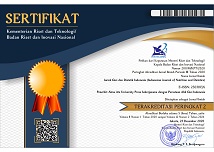Anthropometric knowledge and measurement evaluation among female volunteer community health workers in Depok
Abstract
Background: At the community level, assessment for children nutritional status is measured by female volunteer community health workers (FVCHW) through integrated health post (Posyandu). Based on initial observation, volunteers have sufficient knowledge of anthropometric measurement however, to put it into practice, common pitfalls remain found.Refreshment on basic knowledge and practical training on anthropometric assessment is needed.
Objectives: As part of Kampung Caraka Project that attempts to empower locals to be deliberately aware of community health and well-being, this particular study aims to evaluate knowledge of FVCHW as well as their accuracy and precision on anthropometric assessment.
Methods: This study is a quasi-experimental study with pre-posttest with control group design. The sample was purposively selected and 54 overweight adolescents were divided into a control group and two intervention groups. Education using healthy snacks quartet was conducted for 21 days from September to October 2023 in Makassar City. Data analysis was performed using Wilcoxon singed ranks test.
Results: Results showed women with good precision for MUAC, height, head circumferences and length measurement were 23.1%, 23.1%, 53.8% and 33.3%, respectively. In contrast, only 7.7% of women had good accuracy on MUAC measurement. There is a significant difference of knowledge score before and after the education given (p-value 0.02, CI 95%).
Conclusions: The cadre had good precision yet poor accuracy, implying the necessity of standardized procedure and regular equipment calibration prior to anthropometric measurement. There is a difference in mean scores before and after the education given, yet still denoted as low capacity. Further comprehensive education is highly required.
Keywords
Full Text:
PDFReferences
Saepuddin E, Rizal E, Rusmana A. Posyandu Roles as Mothers and Child Health Information Center. Rec Libr J. 2018;3(2):201.
Susanto F, Claramita M, Handayani S. Peran kader posyandu dalam memberdayakan masyarakat Bintan. Ber Kedokt Masy. 2017;33(1):13.
Artanti S, Ulya N. Refreshing Kader Posyandu Bayi dan Balita sebagai Upaya Peningkatan Pengetahuan dan Keterampilan di Puskesmas Tirto. J ABDIMAS-HIP Pengabdi Kpd Masy. 2023;4(1):6–10.
Didah D. Gambaran peran dan fungsi kader posyandu di wilayah kerja puskesmas Jatinangor. J Kebidanan Malahayati. 2020;6(2):217–21.
Nur Imanah ND, Sukmawati E. Peran Serta Kader Dalam Kegiatan Posyandu Balita Dengan Jumlah Kunjungan Balita Pada Era New Normal. J Kebidanan Indones. 2021;12(1):95–105.
Coburn-Miller C, Casey S, Luong Q, Cameron N, Hocevar-Trnka J, Leung DH, et al. Standardization of Research-Quality Anthropometric Measurement of Infants and Implementation in a Multicenter Study. Clin Transl Sci. 2015;8(4):330–3.
Mocini E, Cammarota C, Frigerio F, Muzzioli L, Piciocchi C, Lacalaprice D, et al. Digital Anthropometry: A Systematic Review on Precision, Reliability and Accuracy of Most Popular Existing Technologies. Nutrients. 2023;15(2):1–39.
Grellety E, Golden MH. The effect of random error on diagnostic accuracy illustrated with the anthropometric diagnosis of malnutrition. PLoS One. 2016;11(12):1–27.
Fryar CD, Gu Q, Ogden CL. Anthropometric reference data for children and adults: United States, 2007-2010. Vital Health Stat 11. 2012 Oct;(252):1–48.
Warrier V, Krishan K, Shedge R, Kanchan T. Height Assessment. In Treasure Island (FL); 2023.
Mony PK, Swaminathan S, Gajendran JK, Vaz M. Quality Assurance for Accuracy of Anthropometric Measurements in Clinical and Epidemiological Studies: [Errare humanum est = to err is human]. Indian J community Med Off Publ Indian Assoc Prev Soc Med. 2016;41(2):98–102.
Anwar F, Khomsan A, Sukandar D, Riyadi H, Mudjajanto ES. High participation in the Posyandu nutrition program improved children nutritional status. Nutr Res Pract. 2010 Jun;4(3):208–14.
Rinawan FR, Faza A, Susanti AI, Purnama WG, Indraswari N, Didah, et al. Posyandu Application for Monitoring Children Under-Five: A 3-Year Data Quality Map in Indonesia. ISPRS Int J Geo-Information. 2022;11(7).
Kalsum U, Jahari AB. The strategy to reduce the prevalence of malnutrition among children under five in Jambi Province (Strategi menurunkan prevalensi gizi kurang pada balita di Provinsi Jambi). Jmj. 2015;3(1):45–59.
Gibson RS. Principles of Nutritional Assessment - Rosalind S. Gibson - Google Books. Oxford University Press. 2005.
Suyatno, Fatimah S, Kartasurya MI. Policy brief akurasi pemantauan status gizi di Posyandu memprihatinkan. Semarang: Universitas Diponegoro; 2019. p. 1.
DOI: http://dx.doi.org/10.21927/ijnd.2024.12(2).159-164
Refbacks
- There are currently no refbacks.

This work is licensed under a Creative Commons Attribution-ShareAlike 4.0 International License.
Indonesian Journal of Nutrition and Dietetics (IJND) indexed by:
 View My Stats
View My Stats



12.png)


























